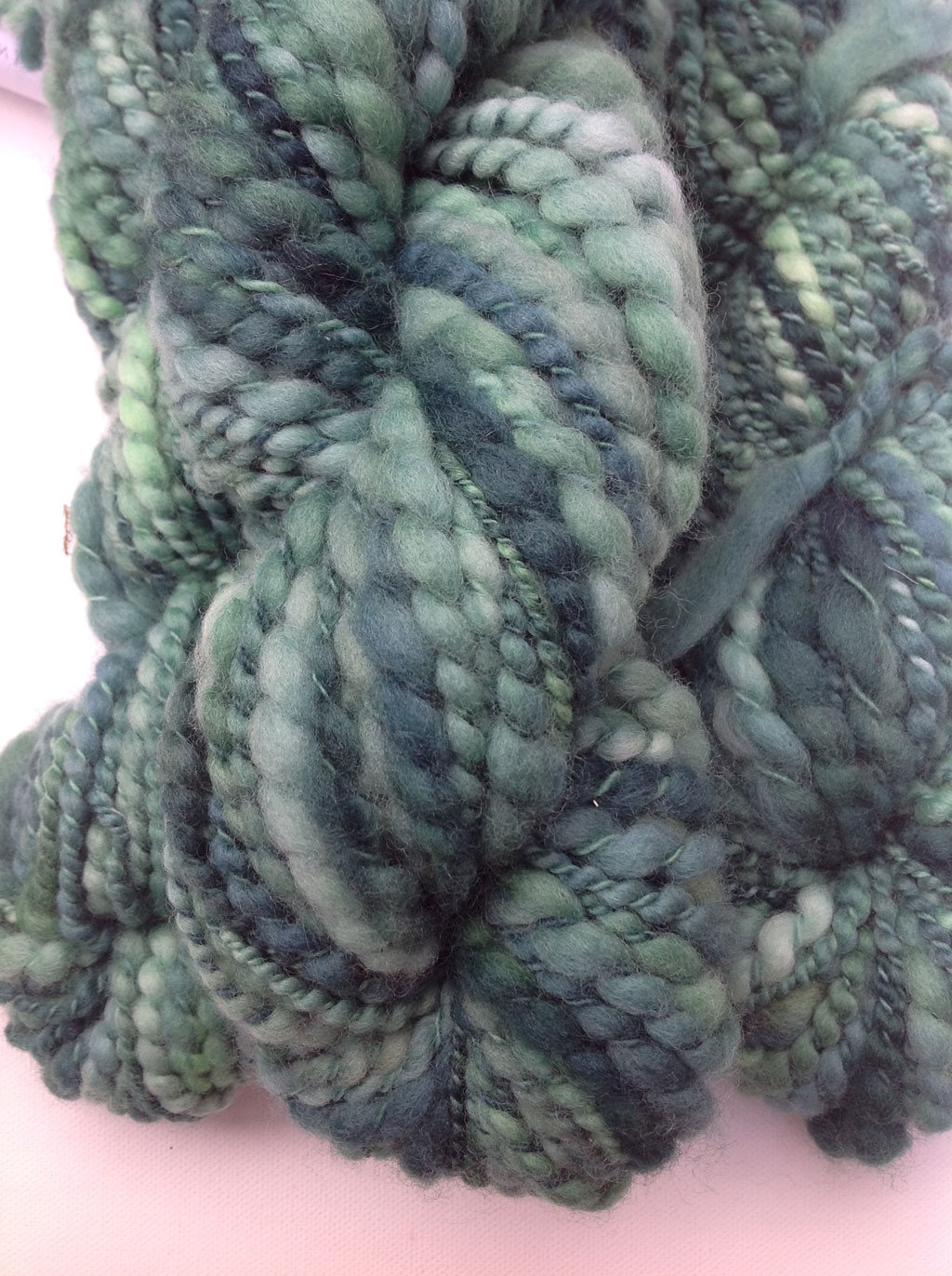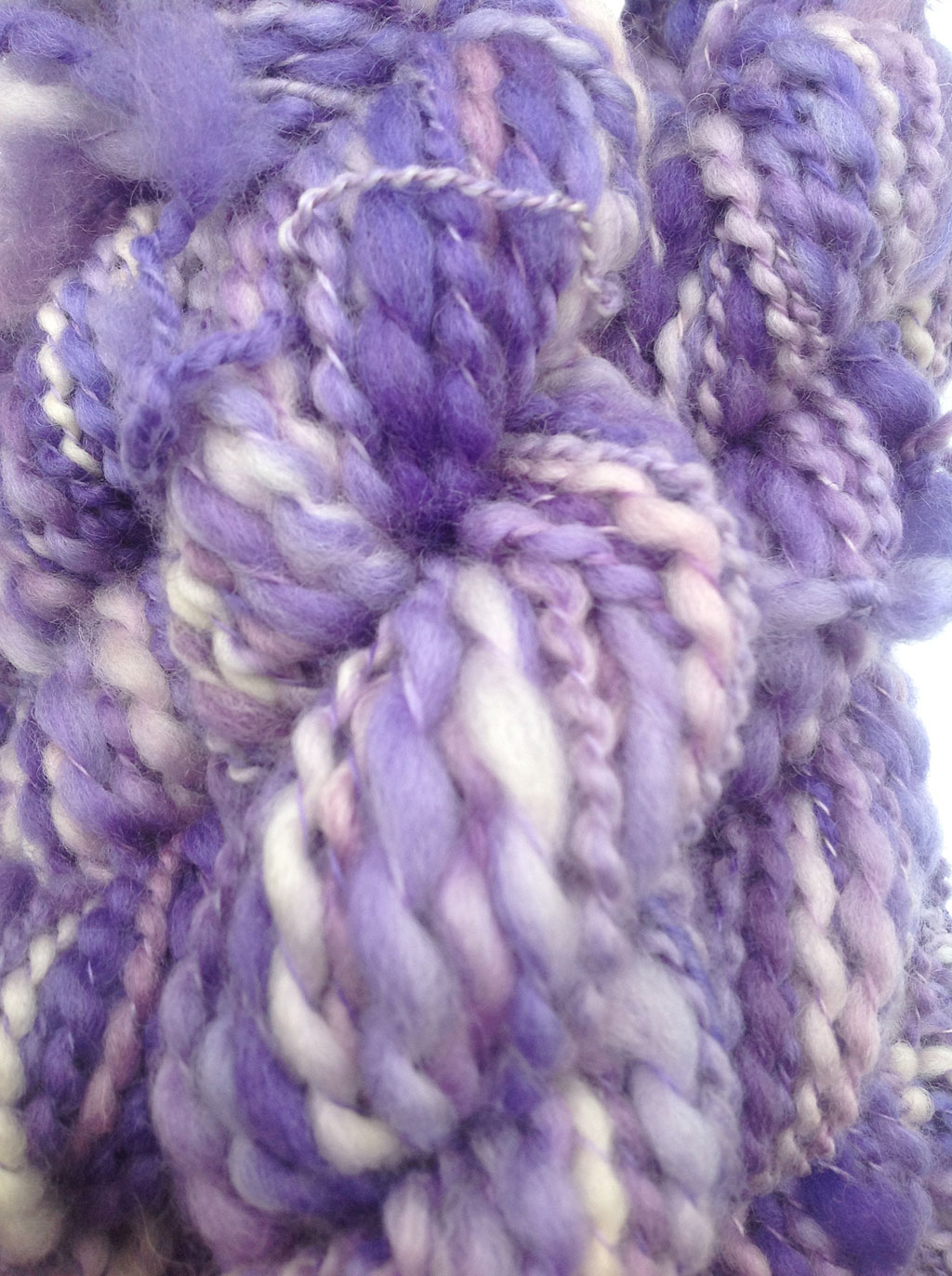This evening’s post is a submission to our competition from Cathy Wright, a hand spinner who runs the Lazy Kate website. In her email to us, Cathy explained that she wanted to explore the issue of obtaining British fibre for a UK hand spinner, and to offer a balanced perspective on the acquisition of prepared fibres that one can feel good about using, and enjoy spinning…
So, the question for some people is this: What do you do when you love sheep, youʼre in awe of the amount of uses there are for fleece, you care about animal welfare and want to support British farmers but… you donʼt like preparing fleece yourself? You donʼt like the muck and vegetable matter? In actual fact, you just want to spin, or dye, or felt?
Bluefaced Leciester wool chunky hand spun in greeny bluey shades
Well, let me tell you, itʼs OK, we can hold our heads up, spin, dye and felt and still keep true to ourselves. One thing we need to make sure is that weʼre informed of the provenance of our wool. So where do we start with this?
I love to dye, I love the new colours that are created from mixing dyes together, either in a big cauldron or in the spinning process when the fibres are drafted, each fibre almost deciding for itself where to pull from to create a shade that had never been considered before. So, as much as I love the natural coloured fleece of a Jacob or the deep chocolate of the Black Welsh Mountain, Iʼm also interested in what I can turn those fleeces into.
Superwash Bluefaced Leicester wool, chunky hand spun in purples and whites
The options that we have as spinners regarding purchase of wool are;
1) Buying imported fibre. Imported fibre is often cheaper, but we are unsure of the welfare of both the animal and the workers and maybe we feel we want to support British Famers
2) Buying fibres from British Farmers. This is not always that simple, British wool often goes through the British Wool Marketing Board; there is a market price for fleece and the farmer receives that. The prices of fleece can increase or decrease. If there is more of a market for British Wool, then this can only be a good thing.
3) If we use imported fibres but these are prepared by British people, giving employment, are we satisfied with that?
What Iʼve found in my research is that communication with your supplier is key. Most suppliers of fibres are very happy to answer your questions about the fibre they offer as they love wool as much as you do!
I spoke to Juliet from John Arbon Textiles and Richard from World of Wool, both were extremely helpful and ready to answer any questions about where their wool came from, what they knew about the welfare of the sheep and where their fibre and yarns are processed.
It isnʼt always easy through one thing and another for them to source a tremendous amount of fibre from this country and as consumers we need to understand this, but they often go the extra mile to try, John Arbon for instance source their merino from the Falkland Islands because of itʼs quality.
The important thing is that we ask the questions and so are able to make an informed decision, donʼt be scared to ask, satisfy your curiosity, make your decision and then spin to your hearts content!
http://www.jarbon.com
www.worldofwool.co.uk
All content © Cathy Wright and republished here with her permission. We enjoyed the practical angle of this piece, and its central message about getting to know one’s suppliers, as this concept is really key to the concept of ‘closing the gap’ between producers and consumers of WOOL. In the interests of expanding on the list of suppliers of washed and prepared fibres for hand spinning supplied with this article, we would like to also highlight the existence of the following suppliers of top-quality 100% WOOL washed and prepared British Fibres with traceable provenance available to hand spinners looking for such materials!
Shearer Girl Yarns – cleaned, carded, breed-specific fibre batts
Wool craft with Wensleydale – scoured, combed pure Wensleydale tops for hand spinning
Risby Grange Long Wools – silky smooth carded Lincoln Longwool tops
Blacker Yarns – carded, scoured, breed-specific fleece, ready for hand spinning
Hilltop Katie – batts and combed/carded fibre, ready for hand spinning

